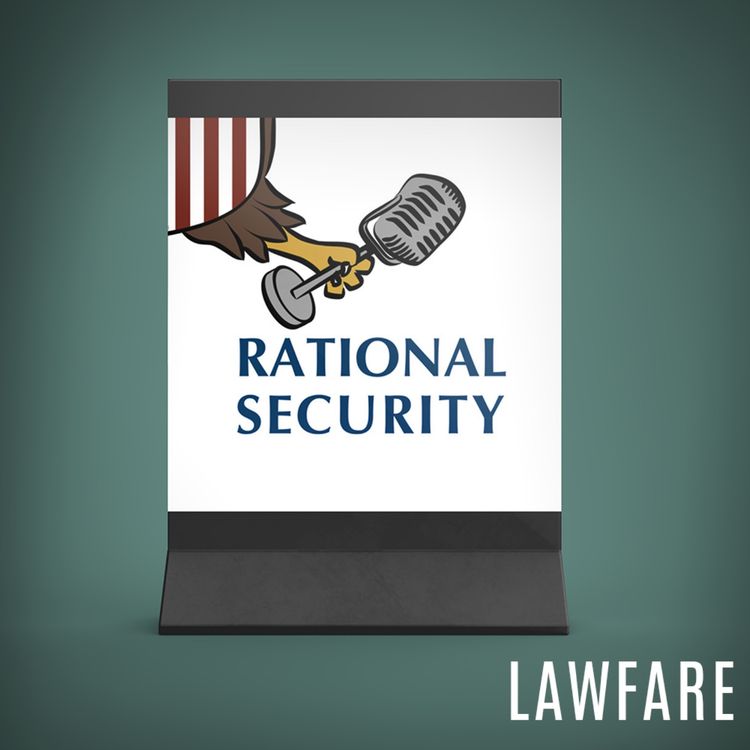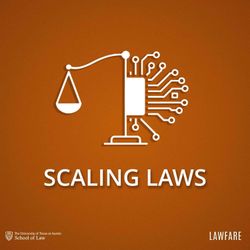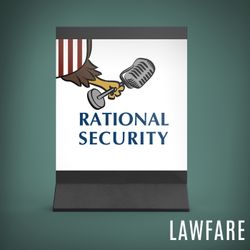Share

The Lawfare Podcast
Rational Security: The “Trashed on Trash Mountain” Edition
This week, Scott sat down with his Lawfare colleagues Anna Bower and Natalie Orpett and Lawfare Contributing Editor Michel Paradis to talk about the week’s biggest national security news stories, including:
- “A Justice Delayed Still Has Justice on the Mind.” After weeks of waiting, New York state court judge Justice Juan Merchan has finally become the first judge to apply the Supreme Court’s Trump v. United States immunity decision, holding that incoming President Donald Trump’s convictions under New York state law may stand and did not unduly rely on conduct for which he is immune. How persuasive is his ruling? And what can it tell us about the future of both Donald Trump’s criminal case and the Supreme Court’s immunity holding?
- “A Break in the Case.” Tectonic shifts in Syrian politics over the past few weeks that has led, among other consequences, to the release of thousands of former prisoners, have brought back to the fore the case of Austin Tice, an American journalist who has been missing in Syria for more than a decade. Believed to have been held by the Assad regime before its collapse, some are concerned that he might have been injured or killed during Israeli airstrikes over the past several weeks. What does Tice’s case tell us about the challenges of wrongful detention cases like his? And what should we make of allegations that the Biden administration is not doing enough to bring him back?
- “Gym, Tan, Low-flying Unmanned Aerial Vehicles.” The state of New Jersey has a new signature activity, as Americans and politicians of all stripes have been voicing concern over reports of mysterious drones of unknown origins operating in the state’s skies. What might explain this phenomenon? And what should we make of the reactions around it?
For object lessons, Anna recommended “Intermezzo,” by Sally Rooney as a read over the holiday. Natalie Orpett endorsed Washington, D.C.’s Eastern Market as a worthwhile visit for holiday shopping, and Scott doubled down with another local recommendation of Middleburg, VA, as a holiday wonderland not to be missed. And Michel wrapped things up with a final endorsement of Weike Wang’s dryly comedic book “Rental House,” for those needing to commiserate over managing family relations over the holiday.
To receive ad-free podcasts, become a Lawfare Material Supporter at www.patreon.com/lawfare. You can also support Lawfare by making a one-time donation at https://givebutter.com/lawfare-institute.
More episodes
View all episodes

Lawfare Archive: Former Ambassador Roberta Jacobson on the Mexico Presidential Election
45:12|From June 18, 2024: On June 2, Mexico held one of the largest elections in its history and the electorate voted in the country's first women, and Jewish, president, Claudia Sheinbaum. Sheinbaum was endorsed by outgoing President Andrés Manuel López Obrador (AMLO), who critics charge as pushing a series of anti-democratic policies including a substantial judicial overhaul. To discuss this historic election and what President-elect Claudia Sheinbaum may do in office, Lawfare Associate Editor for Communications Anna Hickey sat down with former United States Ambassador Roberta Jacobson. They discussed the issues voters were concerned about, political violence by cartels plaguing the country, and whether Sheinbaum will follow AMLO's trajectory as a populist or chart her own path. To receive ad-free podcasts, become a Lawfare Material Supporter at www.patreon.com/lawfare. You can also support Lawfare by making a one-time donation at https://givebutter.com/lawfare-institute.
Lawfare Archive: A Jan. 6 Committee Staffer on Far-Right Extremism
57:19|From February 15, 2023: The Jan. 6 committee’s final report on the insurrection is over 800 pages, including the footnotes. But there’s still new information coming out about the committee’s findings and its work.Last week, we brought you an interview with Dean Jackson, one of the staffers who worked on the Jan. 6 committee’s investigation into the role of social media in the insurrection. Today, we’re featuring a conversation with Jacob Glick, who served as investigative counsel on the committee and is currently a policy counsel at Georgetown’s Institute for Constitutional Advocacy and Protection. His work in the Jan. 6 investigation focused on social media and far-right extremism. Lawfare senior editor Quinta Jurecic spoke with Jacob about what the investigation showed him about the forces that led to Jan. 6, how he understands the threat still posed by extremism, and what it was like interviewing Twitter whistleblowers and members of far-right groups who stormed the Capitol.You can read Jacob’s essay with Mary McCord on countering extremism here in Just Security and listen to an interview with Jacob and his Jan. 6 committee colleagues here at Tech Policy Press.To receive ad-free podcasts, become a Lawfare Material Supporter at www.patreon.com/lawfare. You can also support Lawfare by making a one-time donation at https://givebutter.com/lawfare-institute.
Lawfare Daily: The Legal Fallout After a Fatal ICE Shooting in Minneapolis
40:57|Lawfare Senior Editor Anna Bower speaks with fellow Senior Editors Eric Columbus and Mike Feinberg about the fatal shooting of Renee Nicole Good by an ICE officer in Minneapolis. The discussion covers what is currently known about the incident and the conflicting accounts offered by DHS and the White House in contrast with bystander video. The panel also discusses DHS use-of-force policies, the federal government’s reported investigation of the shooting, and the legal framework governing state prosecutions of federal officers.To receive ad-free podcasts, become a Lawfare Material Supporter at www.patreon.com/lawfare. You can also support Lawfare by making a one-time donation at https://givebutter.com/lawfare-institute.
Scaling Laws: A Year That Felt Like a Decade: 2025 Recap with Sen. Maroney and Neil Chilson
54:36|Connecticut State Senator James Maroney and Neil Chilson, Head of AI Policy at the Abundance Institute, join Kevin Frazier, the AI Innovation and Law Fellow at the University of Texas School of Law and a Senior Editor at Lawfare, and Alan Rozenshtein, Associate Professor at Minnesota Law and Research Director at Lawfare, for a look back at a wild year in AI policy.Neil provides his expert analysis of all that did (and did not) happen at the federal level. Senator Maroney then examines what transpired across the states. The four then offer their predictions for what seems likely to be an even busier 2026. Find Scaling Laws on the Lawfare website, and subscribe to never miss an episode.To receive ad-free podcasts, become a Lawfare Material Supporter at www.patreon.com/lawfare. You can also support Lawfare by making a one-time donation at https://givebutter.com/lawfare-institute.
Rational Security: The “Caracas Like a Hurricane” Special Venezuela Edition
01:05:47|This week, Scott sat down with his Lawfare colleagues Benjamin Wittes, Natalie Orpett, and Molly Roberts for a special deep-dive into the intervention in Venezuela, including:“A Hop, Skip, and Jump Across the Rubicon.” This past weekend, the Trump administration took the step that Trump has been threatening for months: he deployed special operations to capture Venezuelan dictator Nicolás Maduro and bring him to the United States for criminal prosecution. The targeted operation was only hours long and resulted in no American fatalities, though more than 70 people in Venezuela were reportedly killed. The Trump administration has described it as a “law enforcement” operation. But what was it really? And where did he get the authority to do it?“A Truly Extraordinary Rendition.” By Monday, Maduro and his wife were in New York being arraigned on an array of drug- and weapons-related conspiracy charges. But prosecuting a head of state—albeit one not recognized by the United States—presents certain unique challenges. How should we expect the criminal case to proceed? “Running in Place.” President Trump has asserted that he and his advisers are now going to “run” Venezuela. But he’s left Maduro’s deputy, Delcy Rodríguez, in place, in lieu of the opposition movement the United States and many other countries have recognized as Venezuela’s legitimate government. Trump and his advisers seem intent on dictating terms to Venezuela through the “leverage” provided them by the ongoing quarantine over Venezuela’s oil, and potentially the threat of additional military action. But can this light-touch strategy succeed? In object lessons, (notably Chicagoan) Natalie delights in her long-standing admiration of The New Yorker with Netflix’s documentary “The New Yorker at 100.” Molly approaches Trump’s takeover of D.C. golf courses with a pitch for Knotty by Nature’s wooden putters. Scott honors the 5th anniversary of the Jan. 6, 2021, attack on the Capitol with a recommendation of Ellie Silverman’s moving profile of Nathan Tate in the Washington Post. And Ben honors the same anniversary with both a revisiting of Lawfare's narrative podcast series The Aftermath, and, relatedly, a surprise interview by Holly Berkley Fletcher with one of the attack’s most infamous perpetrators. To receive ad-free podcasts, become a Lawfare Material Supporter at www.patreon.com/lawfare. You can also support Lawfare by making a one-time donation at https://givebutter.com/lawfare-institute.
Lawfare Daily: Mary Clare Jalonick on ‘Storm at the Capitol’
47:01|Senior Editor Michael Feinberg and Associated Press reporter Mary Clare Jalonick sit down to discuss Mary Clare’s oral history of the events of Jan. 6, “Storm at the Capitol.” The two reflect on their own experiences from that day, and try to puzzle out what lessons can be drawn from them five years later.To receive ad-free podcasts, become a Lawfare Material Supporter at www.patreon.com/lawfare. You can also support Lawfare by making a one-time donation at https://givebutter.com/lawfare-institute.
Lawfare Daily: The Trials of the Trump Administration, Jan. 5
01:20:21|In a live conversation on YouTube, Lawfare Editor in Chief Benjamin Wittes sat down with Lawfare Senior Editors Anna Bower, Scott Anderson, Michael Feinberg and Eric Columbus and Lawfare Associate Editor Katherine Pompilio to discuss the Supreme Court’s decision on President Trump’s domestic deployment of the National Guard in many cities, Jack Smith’s testimony in front of the House, developments in Kilmar Abrego Garcia’s case, a hearing in the arrest of Venezuelan President Nicolas Maduro and his wife, and moreYou can find information on legal challenges to Trump administration actions here. And check out Lawfare’s new homepage on the litigation, new Bluesky account, and new WITOAD merch.To receive ad-free podcasts, become a Lawfare Material Supporter at www.patreon.com/lawfare. You can also support Lawfare by making a one-time donation at https://givebutter.com/lawfare-institute.
Lawfare Daily: Jan. 6, 2026: Five Years of Congressional Action and Inaction
01:04:52|Today is the fifth anniversary of the Jan. 6, 2021, attack at the U.S. Capitol. That day marked the beginning of a reckoning across the entirety of the U.S. government. How did this happen? What does it mean? And how do we stop it from happening again? On today's podcast, Executive Editor Natalie Orpett discusses how Congress has been responding to these questions with current and former Lawfare senior editors Eric Columbus, Quinta Jurecic, and Molly Reynolds. They talk about what Congress has done, what it hasn’t, and how we should understand the legacy of Jan. 6—so far. You can read, watch, and listen to Lawfare's five years of Jan. 6 analysis on our website. To receive ad-free podcasts, become a Lawfare Material Supporter at www.patreon.com/lawfare. You can also support Lawfare by making a one-time donation at https://givebutter.com/lawfare-institute.
Lawfare Daily: The U.S. Strike on Venezuela and Capture of Nicolás Maduro
49:34|During a live YouTube discussion on Jan. 4, Lawfare Editor in Chief Benjamin Wittes sat down with Lawfare Senior Editor Scott R. Anderson, Foreign Policy Editor Dana Stuster, and Public Service Fellow Loren Voss to discuss what we know—and what we don’t know—about the legal issues raised by the U.S. strike on Venezuela and the capture of Venezuelan leader Nicolás Maduro. They spoke about what the administration's possible policy goals are in Venezuela, the potential legal justifications for the attack and capture of Maduro, and whether or not the United States is at war with Venezuela or some sub-groups. To receive ad-free podcasts, become a Lawfare Material Supporter at www.patreon.com/lawfare. You can also support Lawfare by making a one-time donation at https://givebutter.com/lawfare-institute.